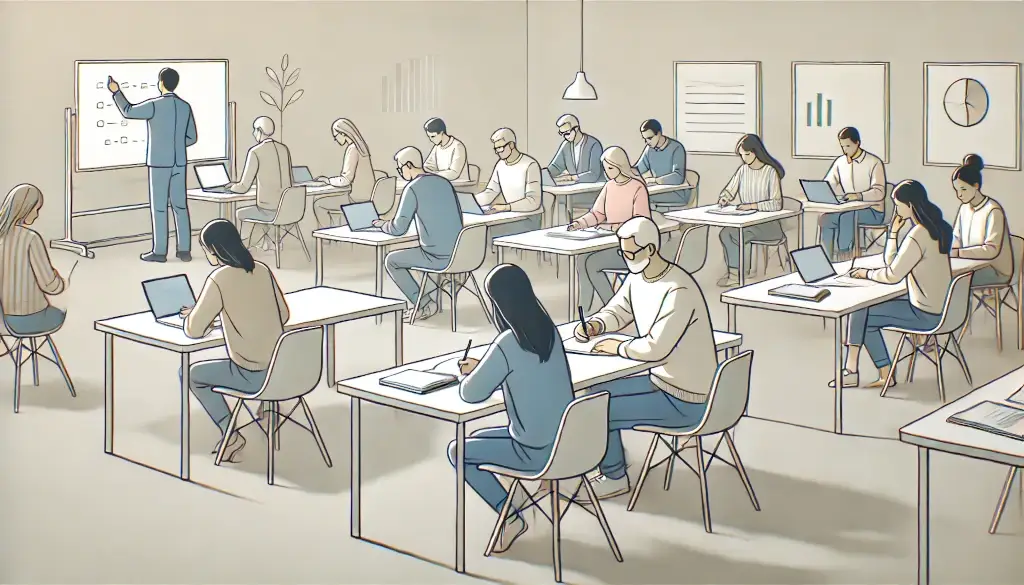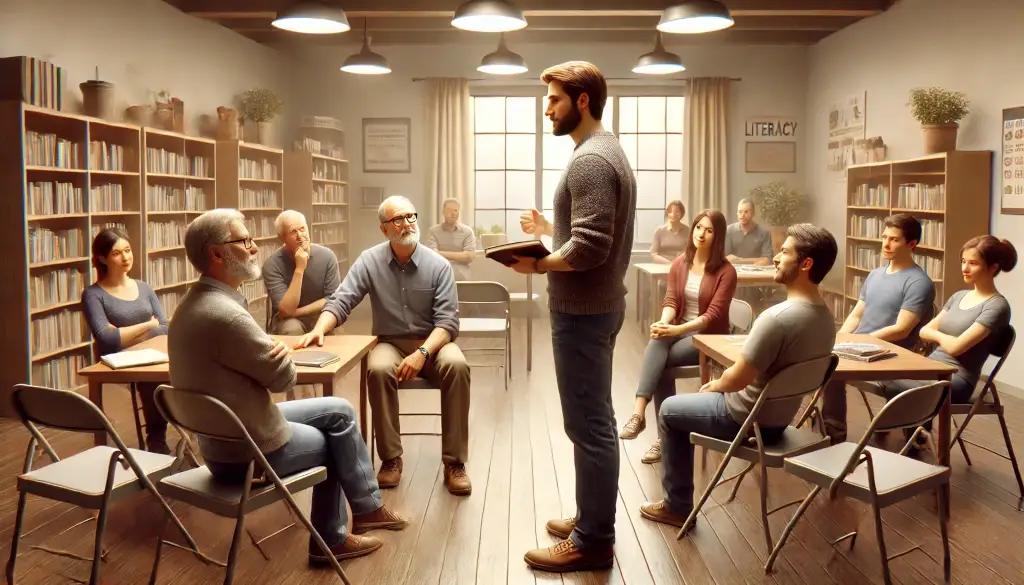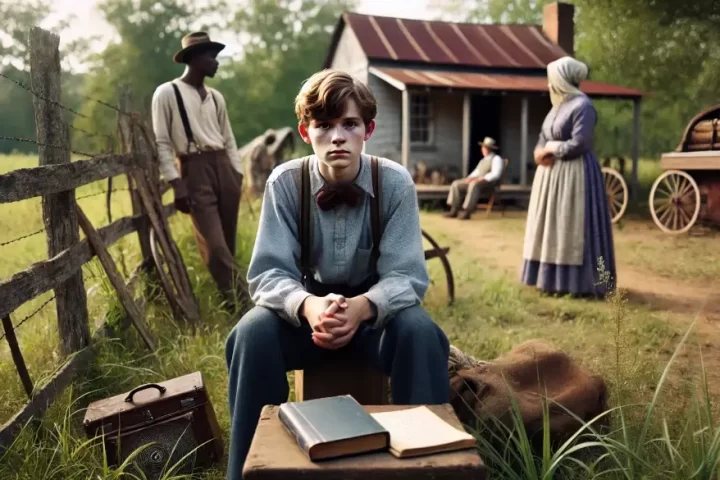Part 2: “Learning to Read in a World of Street Smarts”
John had spent most of his life navigating the world with street smarts and intuition. However, as he grew older, the gaps in his reading skills became harder to ignore. He experienced missed job opportunities and a dangerous health scare. John’s inability to read was limiting his future. After years of getting by without literacy, John reached a breaking point. He realized that if he wanted to live a fuller, healthier life, he had to face the one challenge he had avoided for so long—learning to read.
This is the next chapter in John’s journey, where he takes the first steps toward literacy. He discovers how reading can change not just his life, but the lives of millions of other adults across the United States still struggling with illiteracy.
Table of Contents
- Taking the Leap: Finding a Literacy Program
- Facing New Challenges: Learning to Read as an Adult
- Small Victories: Navigating Life With Literacy
- The Road to a Better Job
- Balancing Literacy with Street Smarts
- Giving Back: Helping Others Overcome Illiteracy
- A New Future: Independence and Confidence
- Conclusion: A Life Transformed
- Resources Available for Those Who Need Them
Taking the Leap: Finding a Literacy Program
At 36, John was determined to make a change after his health scare. It was clear now that his inability to read wasn’t just holding him back financially—it put his life in danger. The hardest part, though, was figuring out where to start.
His friend, Robert, who worked at the local grocery store, mentioned a literacy program at the community center. “It’s for adults,” Robert said. “You’re not the only one, John. A lot of folks from around here are trying to better themselves.”

At first, John hesitated. He was nervous about being judged. After all, most people thought he was doing fine—he’d managed to get by on street smarts for so long that his illiteracy was something he had hidden from almost everyone.
After a few sleepless nights thinking about his health and missed job opportunities, John made the decision. He went to the community center the following Monday, anxious but hopeful. Illiteracy in adults was a hidden struggle, but John was about to take the first step toward breaking free from it.
Facing New Challenges: Learning to Read as an Adult
Walking into the classroom felt like stepping back in time. There were other adults there—some older, some younger. Each had their reasons for being there, and for the first time, John didn’t feel alone. The teacher, Mrs. Jenkins, was patient and kind. She understood how hard it was for adults to come forward and admit they couldn’t read well.
Mrs. Jenkins started them with simple sentences, but John struggled. He hadn’t held a book in his hands in years. His street smarts had helped him survive, but this was different. Letters still seemed to dance on the page, and he found himself frustrated that he couldn’t grasp things as quickly as he thought he should.
However, Mrs. Jenkins caringly reminded him, and the other students, that illiteracy in the U.S. was a bigger issue than most realized. Millions of adults across the country faced the same challenges John did. The fact that he was there, trying to learn, was already a victory.
As the weeks went by, John’s confidence began to grow. He was finally starting to understand how letters formed words, and he could read simple sentences. The first time he read an entire paragraph without help, he felt a wave of pride he hadn’t experienced in years.
Small Victories: Navigating Life With Literacy

Little by little, John began to see the world differently. Tasks that once felt impossible were now within his grasp. He started reading street signs on his own, figuring out directions without relying on landmarks. When he went to the grocery store, he no longer had to look at pictures—he could read the labels and understand what he was buying.
The real test came when he needed to fill out paperwork for his health insurance. In the past, he had always avoided filling out forms, but this time he decided to give it a shot. It wasn’t easy, but after working through it slowly, he managed to complete the forms without help. For the first time in years, John felt independent.
John’s progress wasn’t just a personal victory—it was a reflection of the broader need for improved literacy programs in the U.S. The illiteracy rates in the United States were still a major problem, especially for adults. But John was proof that, with the right resources, people could change their lives.
The Road to a Better Job
One day, while scanning the bulletin board at the community center, John saw a job posting for a construction supervisor position. It paid better than the odd jobs he had been doing, and he had the experience. The only catch? It required reading plans and safety manuals.
A year earlier, John would have walked away from that opportunity, knowing that he couldn’t meet the reading requirements. But now, after months of literacy training, he felt different. He wasn’t a perfect reader, but he had come far enough to know that he could handle the basics.

He applied for the job and, this time, filled out the application himself. During the interview, John was upfront about his past struggles with reading but emphasized how far he had come. To his surprise, the manager was impressed by his honesty and determination. John got the job.
For the first time, he was earning a steady paycheck. He had benefits, and he didn’t have to rely on odd jobs to make ends meet. It was a new chapter in his life, one that was only possible because he had taken the step to improve his literacy.
Balancing Literacy with Street Smarts
John still relied on his street smarts despite his new reading skills. His ability to understand people and navigate tricky situations has always been one of his strengths. Now, however, he had the added tool of literacy, and together, these skills opened up a world of possibilities.
At work, John used his street smarts to communicate effectively with his team, but his new reading abilities allowed him to handle more of the technical aspects of the job. He could read safety manuals, follow written instructions, and even help others with tasks that required basic literacy.
John’s journey wasn’t just about learning to read—it was about blending his natural intelligence with the new skills he had gained. He knew he wasn’t finished learning, but the progress he had made gave him a sense of pride that had been missing for so many years.
Giving Back: Helping Others Overcome Illiteracy
After two years of steady work, John found himself reflecting on how far he had come. He started to realize that many others in his community were still struggling with illiteracy—just like he had been. He decided it was time to give back.
John began volunteering at the same literacy program that had helped him. He shared his story with new students, letting them know that it was never too late to learn. His street smarts and literacy skills made him a valuable mentor. He understood where these adults were coming from, and he had the patience to guide them through the process of learning to read.

John started advocating for literacy programs and speaking at community meetings about his life and the importance of investing in adult education. He knew that improving the literacy rate in the United States wasn’t just about helping individuals—it was about strengthening entire communities.
A New Future: Independence and Confidence
John’s life had changed dramatically since the day he first walked into the community center. He had gone from feeling stuck and dependent on others to becoming a confident, independent man who could navigate the world with both street smarts and literacy.
He still had challenges—there were times when reading difficult documents or complex texts was frustrating—but the difference was that he no longer saw these challenges as insurmountable. John had learned that literacy was a skill he could continue to improve, and with that, the sky was the limit.
As he looked ahead, John realized that his story was a testament to the power of perseverance and the importance of literacy in the U.S. While the illiteracy rates in the United States were still concerning, people like John were proof that change was possible. The key was providing access to resources and support for those who needed it most.
Conclusion: A Life Transformed
John’s journey from a man who couldn’t read past the 8th grade to someone who had successfully integrated literacy into his life was inspiring. His street smarts had always been an asset, but now, combined with his reading skills, they had allowed him to achieve a level of independence and success he had once thought impossible.
His story was not just about overcoming illiteracy in the U.S., but about the power of resilience and the impact that literacy could have on an individual’s life. For John, and for millions of others, literacy was the key to unlocking opportunities and living life to its fullest potential.
End of Part 2
This completes John’s journey in Part 2, focusing on how his literacy skills opened up new opportunities, allowed him to give back to his community, and transformed his life.
Resources Available for Those Who Need Them
Adult Literacy Facts from ProLiteracy: This resource provides data and real-life stories about adult learners, helping contextualize literacy programs’ benefits for adults like John. It also offers insights into the challenges many adults face when learning to read.
The Barbara Bush Foundation for Family Literacy: This foundation offers resources and research on literacy programs across the United States, specifically targeting adult learners and their success stories. It is a helpful reference for the journey toward reading as an adult.
National Coalition for Literacy: This organization advocates for adult education and literacy programs across the U.S., working to improve access to learning opportunities. It can provide background information about the effectiveness of adult literacy initiatives.

Wohh exactly what I was searching for, thankyou for posting.
A formidable share, I just given this onto a colleague who was doing a little bit analysis on this. And he in fact bought me breakfast as a result of I found it for him.. smile. So let me reword that: Thnx for the deal with! But yeah Thnkx for spending the time to debate this, I really feel strongly about it and love reading more on this topic. If possible, as you change into expertise, would you thoughts updating your blog with extra particulars? It is highly helpful for me. Huge thumb up for this weblog publish!